Event: Edward Teller v. David John Marotta
Site: Party
Date: 1977-07-09
Round: 1
White: Edward Teller
Black: David John Marotta
Result: 0-1
I wrote an article on the economic lessons I learned from playing chess. In that article I mentioned this game and a second played against Edward Teller. The article talks about financial lessons which I learned from playing chess. I’m including this post to expand on that article for the analysis of a specific game of chess.
One of the advantages of the practice of always recording your moves is the ability to analyze them later and improve on your playing. It also allowed me to capture one of the few recorded chess games played by Edward Teller despite the fact that he was an avid chess player and played regularly. I’ve learned that Teller learned the moves at age six and first beat his father when he was nine or ten. (I learned around age four and first beat my father at age six.)
This game took place at a social party where theoretical physicist Edward Teller invited me to play chess with him. I was 16 years old, but had been playing tournament chess for several years. Teller was 69 and was was world famous for his work in physics. In this game Teller under estimated my playing ability, tried to defeat a youngster quickly, and ended up losing in the process.
1. e4 c5
2. Bc4 …
Teller begins with what is called the Bowlder Attack. It is an attack which tries to strike quickly at Black’s weakest square, his king bishop pawn. This is the same square I found analyzing the game at six years old plotting and then succeeding to beat my father for the first time. It would work among club players or beginners, but at 16 I’d been playing at the tournament level for several years.
2. … d6
3. d3 Nf6
4. Bg5 e6
5. Nf3 Be7
6. Nc3 O-O
7. e5 …
Better is 7. O-O (Castle king’s side) but Teller wants only to press forward with an attack.
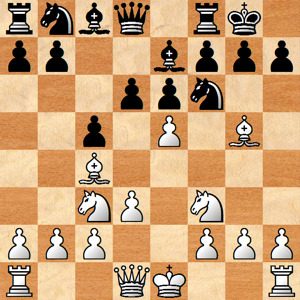
Up until this move both sides are playing a relatively straightforward opening developing their pieces. But now Teller pushes his king pawn in an effort to open up my defenses so that he can disrupt black’s pawn structure and defenses and those pieces can attack.
Better would have been to take at least one more move to castle king’s side and take the time to put his own king in safety while developing his king’s rook.
7… Ne8
8. Bxe7 Qxe7
9. d4 …
Again, better is 9. O-O but Teller continues his attack.
9… d5
Alternately 9. … Nc6
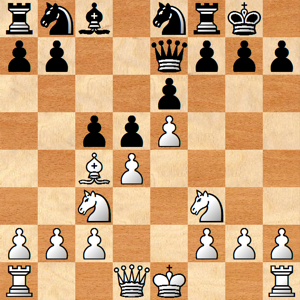
My pawn attacking Teller’s bishop was intended to relieve some of the pressure in the center to allow my pieces to continue to develop. My pawn structure is a strong defense and my king is castled safely, but Teller’s pieces are better developed.
In what was Teller’s playing style, he decided to sacrifice his bishop for three of my pawns to see if once my pawn structure was out of the way he could press forward an attack.
10. Bxd5 …
Better is 10. Bb5.
10… exd5
11. Nxd5 Qd8
12. dxc5 …
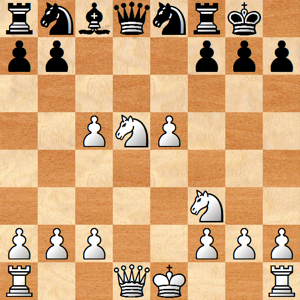
At this point Teller is still materially even (a bishop is worth about three pawns) and has all of black’s remaining pieces on the back row. Teller’s weakness is that when the attack fails, his two advanced pawns will be vulnerable and could be lost.
12. … Be6
13. Nf6+ …
Mistake. 13. Nb4 or Nf4 is required.
13… Nxf6
14. Qxd8 Rxd8
15. exf6 gxf6
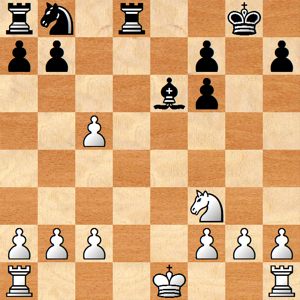
Teller gives up the first advanced pawn to open up black king side pawn defense. But Teller has exchanged so many pieces that he lacks the ability to press an attack on the opened king side. I’m now materially ahead by a bishop for two of Teller’s pawns. A bishop is usually worth three pawns, so it is as thought I am one pawn ahead.
In tournament chess being a pawn ahead usually means a won game. This general principle is true in wealth management as well. Very small changes have large effects over time. My challenge in this situation is that my king’s bishop pawns are “doubled” meaning that they are in the same column and cannot defend one another in a chain or pawn structure. I am in danger of losing one of these pawns, but Teller is in danger of losing his advanced pawn.
16. O-O …
Teller castles now to bring his rook in play. Better would be 16. a3
16… Nd7
More effective is 16. … Na6.
I begin my attack on Teller’s advanced pawn. Knight to a6 would have been more effective as it would have also attacked the square b4 and prevented Teller’s response.
17. b4 a5
18. a3 Ne5
19. Rfd1 Nxf3+
20. gxf3 …
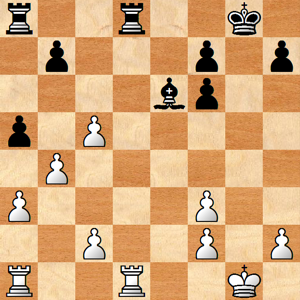
Now Teller’s king side pawn structure is just as weak and the game should be won for black. With a bishop for two pawns ahead I start exchanging material to reduce the game to a won position and then win some additional pawns.
20. … axb4
21. Rxd8+ Rxd8
22. axb4 Rd4
23. Ra8+ Kg7
24. c3 Rc4
Accomplishing more would be 24. … Rd3.
25. Rb8
The move 25. Ra3 defends better.
25… Bd5
Winning faster is 25. … Rh3 26. Ra8 Rxc3 27. Ra1 Rb3.
26. Kg2 Rxc3
I’ve taken control of the position without giving up any material. Here I win another pawn.
27. Rd8 Bxf3+
And I win a third pawn. Now I am ahead a bishop, having regained all three pawns.
28. Kg3 Bc6+
29. Kf4 …
Mistake. Black wins with 29. … h5 30. Rd5 Bxd5. 31. any Rf3##
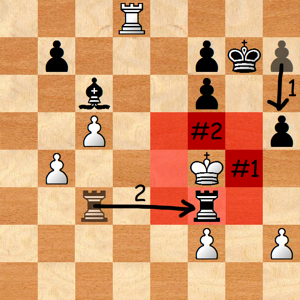
I missed the fact that white’s king was nearly cornered in the center of the board. Pushing the king rook pawn removes square #1 threatening move 2 which both checks the king as well as eliminating the white king’s last escape square #2.
Instead I simply worked at continuing to clean up whites pawns to win the game.
29… Rc4+
Missing the mate, but preserving the win.
30. Ke3 Rxb4
At this point Teller has no more attacking chances and resigns.
0 – 1
Teller challenged me to a second game where I played the white pieces.